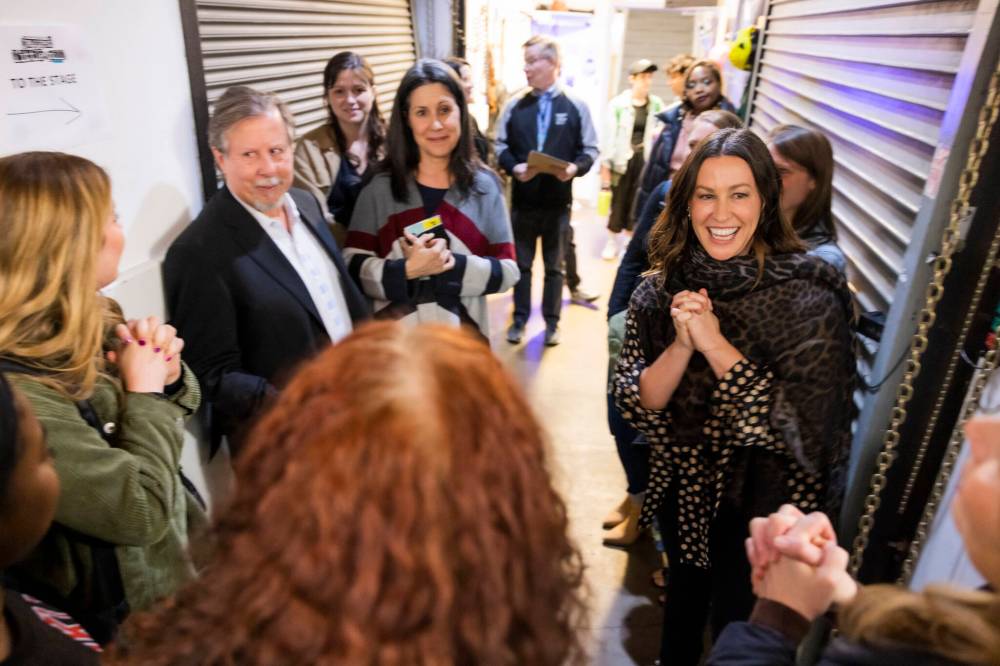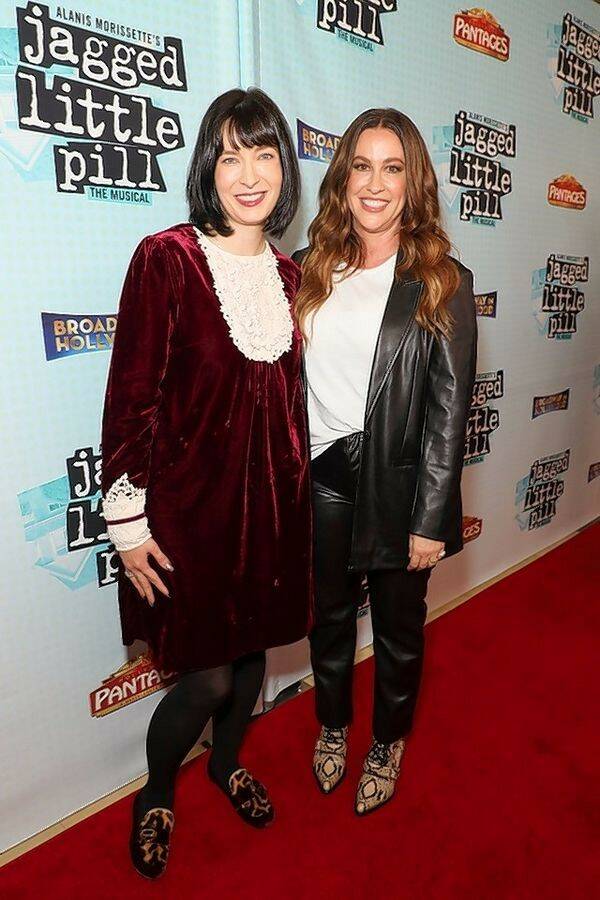You live, you learn Oscar-winning screenwriter grew up listening to Alanis — now she’s helped turn an idea into a Tony-winning sensation
Read this article for free:
or
Already have an account? Log in here »
To continue reading, please subscribe:
Monthly Digital Subscription
$1 per week for 24 weeks*
- Enjoy unlimited reading on winnipegfreepress.com
- Read the E-Edition, our digital replica newspaper
- Access News Break, our award-winning app
- Play interactive puzzles
*Billed as $4.00 plus GST every four weeks. After 24 weeks, price increases to the regular rate of $19.00 plus GST every four weeks. Offer available to new and qualified returning subscribers only. Cancel any time.
Monthly Digital Subscription
$4.75/week*
- Enjoy unlimited reading on winnipegfreepress.com
- Read the E-Edition, our digital replica newspaper
- Access News Break, our award-winning app
- Play interactive puzzles
*Billed as $19 plus GST every four weeks. Cancel any time.
To continue reading, please subscribe:
Add Free Press access to your Brandon Sun subscription for only an additional
$1 for the first 4 weeks*
*Your next subscription payment will increase by $1.00 and you will be charged $16.99 plus GST for four weeks. After four weeks, your payment will increase to $23.99 plus GST every four weeks.
Read unlimited articles for free today:
or
Already have an account? Log in here »
Hey there, time traveller!
This article was published 06/10/2023 (740 days ago), so information in it may no longer be current.
In 1995, when singer-songwriter Alanis Morissette released her landmark album Jagged Little Pill, putting voice to adolescent angst for generations of young women, Oscar-winning screenwriter Diablo Cody (then known as Brook Busey) was a 16-year-old Catholic school girl in Illinois.
“I was the target demographic,” says Cody, over the phone from her home (her closet, specifically) in Los Angeles. “I heard that album and I related to so many of the themes on it. The pressure to be perfect in your family. Religious trauma. Being desperate to express myself in a society that was trying to tamp down my individuality.
“And Alanis was a peer — she was only 19 years old when she wrote those songs.”
Alanis Morissette and the company of Jagged Little Pill: The Musical. Diablo Cody was given one rule prior to writing the musical’s plot: no Morissette allowed. The production was nominated for 15 Tony Awards in 2020 and won two. (Elman Studio)
And now, they are creative peers. Cody made her Broadway debut writing the book for Jagged Little Pill: The Musical, the touring production of which runs at the Centennial Concert Hall Oct. 17 to 22.
Let’s talk about life for a while
There would be no Jagged Little Pill: The Musical without Jagged Little Pill, Alanis Morissette’s groundbreaking, decade-defining album.
In advance of the touring production coming to Centennial Concert Hall, the singer-songwriter answered a few questions via email.
Free Press: What was the genesis of this project and finding its story? I know you’ve said in the past that you didn’t want it to be a traditional jukebox musical and you didn’t want it to be about you.
There would be no Jagged Little Pill: The Musical without Jagged Little Pill, Alanis Morissette’s groundbreaking, decade-defining album.
In advance of the touring production coming to Centennial Concert Hall, the singer-songwriter answered a few questions via email.
Free Press: What was the genesis of this project and finding its story? I know you’ve said in the past that you didn’t want it to be a traditional jukebox musical and you didn’t want it to be about you.
Alanis Morissette: When the producers ran the idea past me, I thought, “Well that sounds interesting, but the only way I’d want to do it is if it wasn’t a jukebox musical.” It would have to be a story I could sink my heart’s teeth into. As with anyone who co-writes or writes fiction, a lot of this story is quote-unquote not autobiographical, but it’s impossible not to have our personal experiences show up, whether it’s (book writer) Diablo Cody or me or any of us who write. It’s hard to not beautifully impose our personal experience into any story, fiction or otherwise, so it’s personal in that sense, and anyone who knows me well can pick that up when they are watching it. Diablo matched the tone of the songs with the tone of the story. I love her so much.
FP: Tell me about working with the creative team — specifically Tom Kitt and Diablo Cody — to bring this to the stage. What was the process like?
AM: There were several meetings with Pulitzer Prize winners, but it didn’t feel like a match until I met Diablo Cody, at which point I had a sense of what this could be and I got really excited. And then director Diane Paulus (Hair, Pippin) signed on and then choreographer Sidi Larbi Cherkaoui, I thought, wow, this is one plus one plus one equals 500. You couldn’t swing a dirty sock without hitting wild talent all around me.
FP: The endurance of this album! The hold it has on us! It was honestly electric and revelatory to hear a woman be angry and vulnerable. Why do you think it continues to have the resonance it has?
AM: I often tell people that when I write my songs initially, they are for myself, not unlike a journal entry, to feel the liberation and anchoring of being fully expressed. The process of writing helps define and clarify and organize things, internally. Then, once I share them, they are not mine anymore. People can interpret them in whatever way they want. I love hearing people’s interpretations of the songs. These songs are offered as support for anyone who might benefit from the comfort or clarity or empathy.
FP: What does it mean for you that this album has a whole new life as a different creative project?
AM: What I love about it the most is that the essence of what I’m sharing is that it’s safe to be human and (have) all the feelings. I think empaths and highly sensitives don’t shy away from feelings, whether it’s anger, frustration, rage, joy, peace, pain, sadness — all of it. I think it’s an invitation and a permission-giving, in a way, to feel. At one point, early on, people said to me, ‘Are you afraid of how many topics you are touching on during this story?’ and I said no. I’m not, actually, because I can hold this complexity and I refuse to underestimate the audience. They can hold it, too.
FP: You are usually the one to perform these songs, so what has it been like for you to hear them performed back to you by these characters?
AM: Yes. My being in the audience or in the workshop beholding … it was the first time I was receiving my own songs, and I was blown away. (How do you say that without sounding like an egomaniac? Haha.)
I was really moved because I had my first taste of objectivity in a way that, as you can imagine, is hard to achieve when you are monologizing around the planet onstage for so many years. To receive it was really moving.
It was also impactful to receive it through gender-bending methods — basically the songs were often gender-bent in order to integrate into the story of the family, the Healys. So, hearing Steve’s character sing Mary Jane or hearing Nick’s character sing Perfect — there’s something about that vulnerability in a male body that just keeps reducing me to tears.
After premièring at the American Repertory Theater in Cambridge, Mass., in 2018, the Diane Paulus-directed musical — which features the songs from the album, with arrangements by Pulitzer Prize-winning composer Tom Kitt, as well as two new songs Morissette wrote for the show — had a successful run on Broadway, where it racked up rave reviews and 15 Tony Award nominations, with Cody winning for Best Book of a Musical.
But all of that is icing on top of the chance to work with Morissette.
“I have met a lot of my heroes over the years and I have been disappointed at times. This was not one of those times. Working with her was even more incredible than I could have ever dreamed. She allowed me complete creative freedom, but was also incredibly helpful and insightful,” Cody says.
Cody is well-versed in storytelling for the screen, winning both an Oscar and a BAFTA for her screenwriting debut, 2007’s coming-of-age film Juno. Writing for the stage was brand new for her.
“I was going in completely green, and I just kind of trusted the process,” she says.
Cody was given only one guideline: Morissette didn’t want the musical to be about her. “That was really the only boundary I couldn’t cross — and I didn’t want to. I wanted to do an original story.”
Jagged Little Pill: The Musical follows Mary Jane, a mother with a fine life — on the surface. (Matthew Murphy / Elman Studio)
Jagged Little Pill: The Musical centres on Mary Jane (MJ) Healy (who will be played by Broadway actor Julie Reiber), a suburban mother of two whose life looks great on paper (in this case, the annual Christmas letter) but is falling apart as she struggles with an addiction to painkillers.
Theatre preview
Jagged Little Pill: The Musical
● Centennial Concert Hall
● Oct. 17-22
● Tickets at centennialconcerthall.com and 204-949-3999
Finding that story involved a close relisten to Jagged Little Pill, an album Cody knows by heart.
“And this magical thing happened, very early into the process, where I realized, there is a story in here. This is a cinematic album, this album has characters, it’s like a screenplay.”
Her first bolt of inspiration came from the song Mary Jane.
“That’s one of the more mysterious tracks on Jagged Little Pill,” Cody says. “It wasn’t a single; people don’t really talk about it. But when I listened to it, I thought, OK, this is the protagonist of the show.
“This woman, who has just been suppressing all of her own desires and appetites in order to be presentable for the world. And that was where the character of Mary Jane Healy came from.”
Writer Diablo Cody (left) and singer-
songwriter Alanis Morissette. (Supplied)
The rest spooled out from there. Listening to Perfect, she found Nick, MJ’s son, through whom she’s been living vicariously. “And he is suffering in silence, having to live up to all these impossible standards that his mom has set for him.”
In All I Really Want, the album’s opener, Cody heard “the voice of a defiant teenage girl,” a voice that would belong to Frankie, MJ’s daughter.
Though the album hails from 1995, Cody wasn’t interested in writing a ‘90s nostalgia revue, and neither was Morissette. The musical is set in the present day and deals, head on, with modern issues of gender identity, race, sexual violence and opioid addiction — topics that took great research and care.
“It’s kind of impossible to write a story about a modern American family that doesn’t touch on any of those things,” Cody says. “We just live in really chaotic times. And this was pre-pandemic too. I think a version of Jagged Little Pill I started today would possibly be even more confrontational.

“I did not set out to write, like, the most issue-laden, politically charged musical ever. It just kind of happened.”
Being part of the next iteration of the cultural force that is Jagged Little Pill is something that Cody hasn’t really processed.
“I can’t really think of myself as having contributed to the Jagged Little Pill legacy in any way, even though I guess, intellectually, I know that I have now,” she says. “It’s just too cool. I love the album too much to even allow myself to entertain that possibility. I feel like I’m Alanis’s little helper, and I’m glad that I played a small part.”
jen.zoratti@winnipegfreepress.com

Jen Zoratti is a columnist and feature writer working in the Arts & Life department, as well as the author of the weekly newsletter NEXT. A National Newspaper Award finalist for arts and entertainment writing, Jen is a graduate of the Creative Communications program at RRC Polytech and was a music writer before joining the Free Press in 2013. Read more about Jen.
Every piece of reporting Jen produces is reviewed by an editing team before it is posted online or published in print – part of the Free Press‘s tradition, since 1872, of producing reliable independent journalism. Read more about Free Press’s history and mandate, and learn how our newsroom operates.
Our newsroom depends on a growing audience of readers to power our journalism. If you are not a paid reader, please consider becoming a subscriber.
Our newsroom depends on its audience of readers to power our journalism. Thank you for your support.

